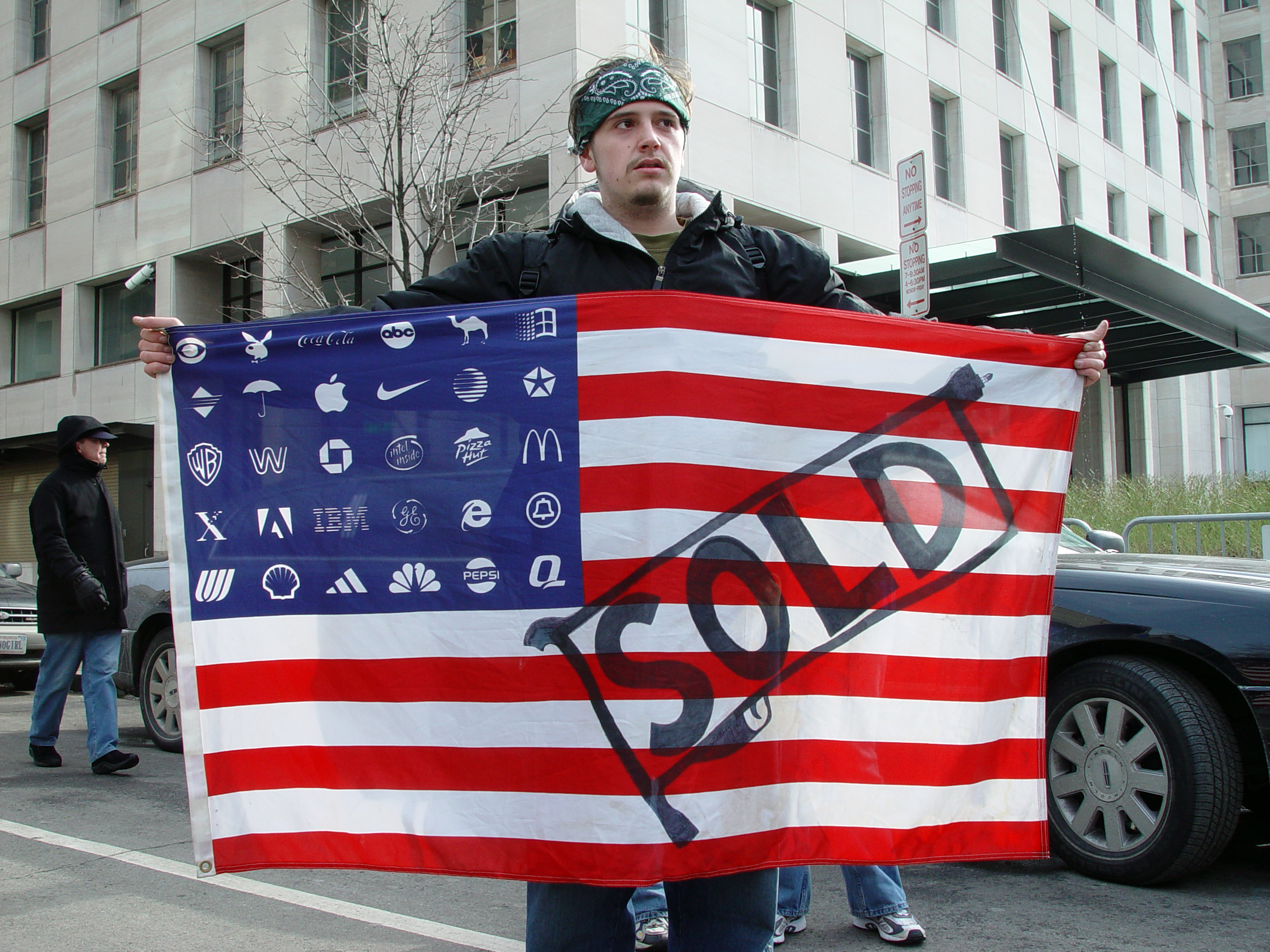“In too many countries, people are deprived of their most basic needs and go to bed hungry every night because of corruption, while the powerful and corrupt enjoy lavish lifestyles with impunity.” – José Ugaz, Transparency International
Corruption and inequality—two sides of the same coin. In the U.S. corruption is a force to be reckoned with. Of the 176 countries ranked on the latest (2016) corruption index (1 being the least corrupt), U.S. hangs on to an undistinguished 18th place. Not surprisingly, inequality is rising as corruption becomes more pervasive. The signs of galloping inequality are everywhere. Since the 2007-2008 subprime mortgage crisis, over 11 million Americans have lost their homes. The expectation that future generations would live better, richer lives than their parents has also taken a hit. In the 1940s, 90% of children born in the U.S. wound up earning more than their parents. Forty years later in the 1980s, only 50% do. A growing oligarchy calls the shots, five of the six richest men in the world are Americans. Unlike countries with more wide-spread corruption where bribery and extortion undermine public confidence, governmental functions are auctioned off to the highest bidder and national economies are robbed blind, in the U.S, corruption is more nuanced — 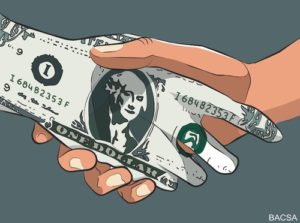 public policy is undermined by back room deals, conflicts of interest, financial hanky-panky, lax federal oversight and less than aggressive law-enforcement. The more corruption has permeated a country’s governmental structure, the greater the disparity between rich and poor. While the wealthy live high on the hog, the rest of us share the fall-out from foreclosed homes, depleted pensions, a healthcare reform that made insurance companies richer and left us hanging on by our fingernails.
public policy is undermined by back room deals, conflicts of interest, financial hanky-panky, lax federal oversight and less than aggressive law-enforcement. The more corruption has permeated a country’s governmental structure, the greater the disparity between rich and poor. While the wealthy live high on the hog, the rest of us share the fall-out from foreclosed homes, depleted pensions, a healthcare reform that made insurance companies richer and left us hanging on by our fingernails.
Not just in America, corruption is an abiding menace in much of the world. Some handle it better than others. For example, take two U.S. favs — England and Israel whose corruption rankings are worlds apart. England is the tenth least corrupt nation in the world outstripping the U.S. by a country mile while Israel at 28 out-corrupts the U.S. by a healthy margin and is considered more corrupt than nations with more dubious reputations like UAE (United Arab Emirates), Botswana, Estonia, Qatar, and Poland.
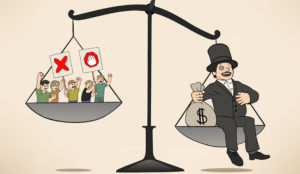 As we have seen inequality is a major trigger of corruption. Bank on it, where the gap between rich and poor is most extreme, corruption follows a similar trajectory. But that’s not the only trigger of corruption. There is one other less noticeable, but as destructive: instability brought on by strife and war, particularly the dislocations created by external forces meddling in the affairs of less powerful nations. Sound familiar?
As we have seen inequality is a major trigger of corruption. Bank on it, where the gap between rich and poor is most extreme, corruption follows a similar trajectory. But that’s not the only trigger of corruption. There is one other less noticeable, but as destructive: instability brought on by strife and war, particularly the dislocations created by external forces meddling in the affairs of less powerful nations. Sound familiar?
What about those countries the U.S. “liberated” from dictators and autocrats? Since 1945, at least 16 nations have felt the heavy boot of the U.S. military invading their sovereign space, “promoting democracy” as the bombs fall from American planes. How has that worked out? You decide.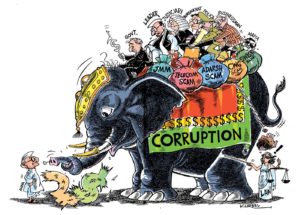
In 6 countries, Vietnam (U.S. invaded 1961-1973), Dominican Republic (invaded 1965), Lebanon (invaded 1982-1984), Somalia, most corrupt nation in the world (invaded 1993), Laos (invaded 1971), Cambodia (invaded 1970), corruption levels are off the charts. In three countries, Iraq, Afghanistan and Libya, where the U.S. military is still operating, corruption is massive and wide-spread, a root cause of political instability and government dysfunction. Iraq in particular, is a cautionary tale. Billions of U.S. dollars meant to restore and reconstruct that shattered country “appear to have been lost to corruption and waste.” (“How the US sent $12bn in cash to Iraq. And watched it vanish”)
Another continuing U.S.-generated catastrophe is taking place in Afghanistan. The modern economy that was supposed to be the result of the U.S invasion and seventeen-year occupation has been supplanted by a narco-state producing the majority of the world’s supply of heroin, a derivative of opium. (“Production has soared in the world’s opium capital.”) The UN Office on Drugs and Crime [UNODC] reports that [Afghanistan] “accounted for almost two-thirds of the total area under illicit opium cultivation” in 2015.” To add to Afghanistan’s woes, President Trump announced on August 22 that the U.S. will send yet more U.S. cannon fodder into Afghanistan not, he was quick to point out for the purpose of “nation building “ solely for “killing terrorists.” What could possibly go wrong with that?
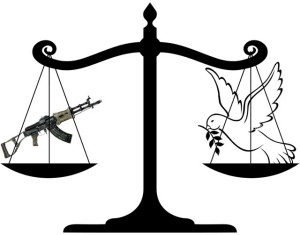 Moving right along to the Americas, no, the U.S. hasn’t spared its neighbors. The same authoritarian, zero-tolerance law-enforcement has been exported to our southern neighbors like a bad case of the flu. The corruption index is these countries is a testament to the instability and economic chaos U.S. efforts to further enrich its transnational corporations have wrought. Six South American countries, Nicaragua (130), Ecuador (107), Bolivia (99), Mexico, (95), and Colombia (83) are among the world’s most corrupt governments.
Moving right along to the Americas, no, the U.S. hasn’t spared its neighbors. The same authoritarian, zero-tolerance law-enforcement has been exported to our southern neighbors like a bad case of the flu. The corruption index is these countries is a testament to the instability and economic chaos U.S. efforts to further enrich its transnational corporations have wrought. Six South American countries, Nicaragua (130), Ecuador (107), Bolivia (99), Mexico, (95), and Colombia (83) are among the world’s most corrupt governments.
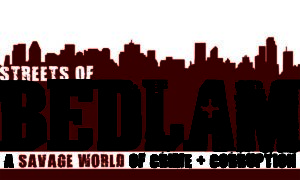 In lockstep with the upswing in corruption —the growing homicide rate in many of these same countries. In 2016, 26.5 people in Colombia were murdered per 100,000 inhabitants, in Bolivia 12.4. Even in the U.S. murder rates track comparably with corruption (18) with 5.2 homicides per 100,000 inhabitants. Contrast the U.S. murder/corruption rate with Canada’s — corruption ranking in the top ten (9) and a total of 1.5 homicides per 100,000 inhabitants. When Americans and Canadians were asked if they felt safe walking alone at night, 82% of Canadians responded affirmatively, while only 72% of Americans said they felt safe.
In lockstep with the upswing in corruption —the growing homicide rate in many of these same countries. In 2016, 26.5 people in Colombia were murdered per 100,000 inhabitants, in Bolivia 12.4. Even in the U.S. murder rates track comparably with corruption (18) with 5.2 homicides per 100,000 inhabitants. Contrast the U.S. murder/corruption rate with Canada’s — corruption ranking in the top ten (9) and a total of 1.5 homicides per 100,000 inhabitants. When Americans and Canadians were asked if they felt safe walking alone at night, 82% of Canadians responded affirmatively, while only 72% of Americans said they felt safe.
 The U.S kicks the problem up a notch as it grapples with the correlation between corruption and violence— starting with the highest gun ownership in the world (112.6 gun per 100 people) and ending with a tsunami of violent confrontations in the streets. Between 2014-2016 1,319 road rage episodes resulted in 136 deaths and 354 injuries. In a AAA poll conducted in 2016, 80% of U.S. drivers admitted feeling anger, aggression or road rage at least once in the previous year. Even worse, over eight million drivers exhibited more aggressive behavior including bumping or ramming vehicles, or leaving their car to confront another driver. (“Nearly 80 Percent of Drivers Express Significant Anger, Aggression or Road Rage”)
The U.S kicks the problem up a notch as it grapples with the correlation between corruption and violence— starting with the highest gun ownership in the world (112.6 gun per 100 people) and ending with a tsunami of violent confrontations in the streets. Between 2014-2016 1,319 road rage episodes resulted in 136 deaths and 354 injuries. In a AAA poll conducted in 2016, 80% of U.S. drivers admitted feeling anger, aggression or road rage at least once in the previous year. Even worse, over eight million drivers exhibited more aggressive behavior including bumping or ramming vehicles, or leaving their car to confront another driver. (“Nearly 80 Percent of Drivers Express Significant Anger, Aggression or Road Rage”)
One-on-one violence is a small piece of a much bigger and deadlier problem: mass shootings that are turning into an American right of passage. The evidence is all around: at a nightclub in Orlando (50 dead), in a place of worship in Charleston, South Carolina (9 killed), at a Planned Parenthood clinic in Colorado Springs, Colorado (3 dead), on a college campus in Roseburg, Oregon (9 dead) and that’s only the more recent ones.
America has become a violent and unforgiving place. The take-away is irrefutable —a corrupt society is not only unequal but dangerous and deadly. Abroad, endless war, at home a society where over a quarter of Americans do not feel safe walking alone at night. As inequality widens the gap between the few and the many, violence and chaos rip apart the peace and security we once felt in an America that no longer seems like home.
The dissension tearing apart American society is a symptom of national distress where corruption is the vanguard of a whole host of other plagues —inequality, crime, instability and civic unrest.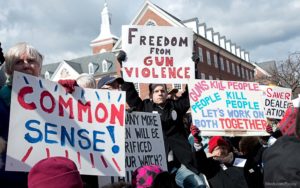
To recapture the freedom, liberty and democracy that most Americans consider our greatest strengths requires a willingness to restore an almost forgotten notion of the obligation of citizens to be the leaders of the movement for a better world. Even the oligarchs in their persona as founding fathers knew the formula – “It behooves our citizens to be on their guard, to be firm in their principles, and full of confidence in themselves. We are able to preserve our self-government if we will but think so.” (Thomas Jefferson)
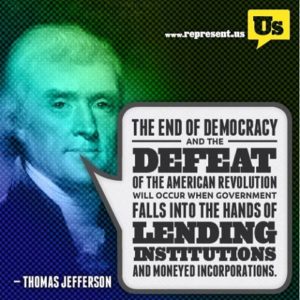 How do we do that? By pressuring the leaders whose jobs depend on our support and who are elected to carry out the “will of the people” to remake the government, to reject the highly militarized state where secrecy and surveillance rule the day and in place of the pay for play ethos that rewards well-connected corporate leaders and political officials substitute a national consensus for a government defined by transparency and accountability. Citizen power can save the day.
How do we do that? By pressuring the leaders whose jobs depend on our support and who are elected to carry out the “will of the people” to remake the government, to reject the highly militarized state where secrecy and surveillance rule the day and in place of the pay for play ethos that rewards well-connected corporate leaders and political officials substitute a national consensus for a government defined by transparency and accountability. Citizen power can save the day.
“Never doubt for a moment that a small group of thoughtful committed citizens can change the world. Indeed, it is the only thing that ever has.” (Margaret Mead)
At its most basic it’s a chicken and egg problem —which came first —corruption or inequality?
We provide possible answers. What do you think?
Let us know at info@suspiciousangels.com or on twitter @SUSPIANGELS.
